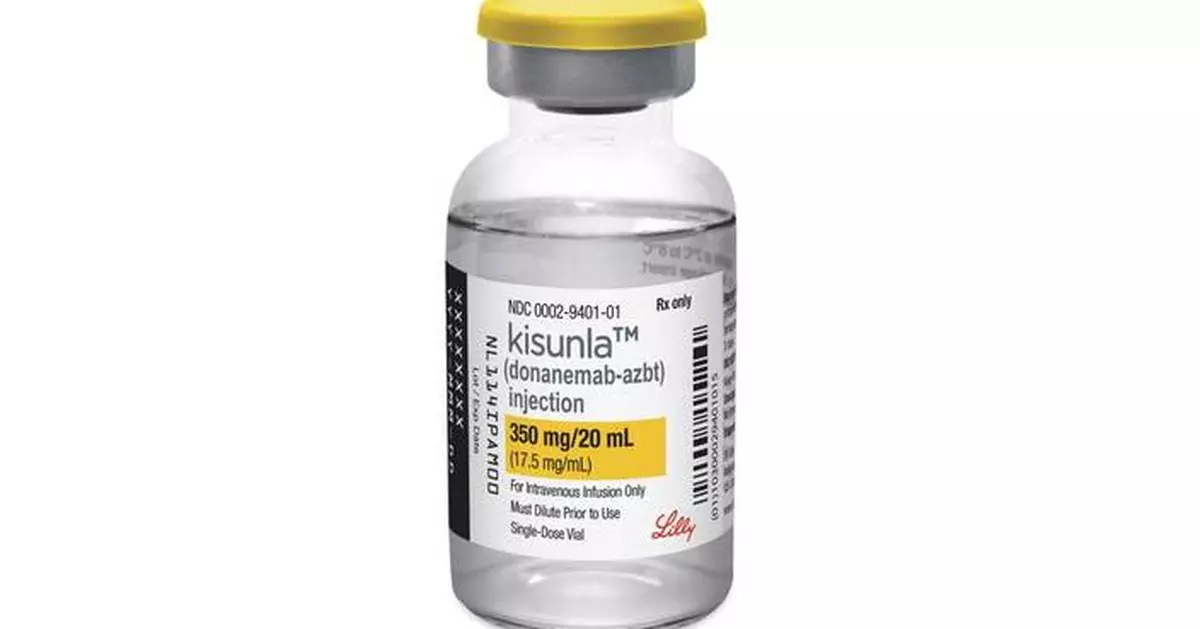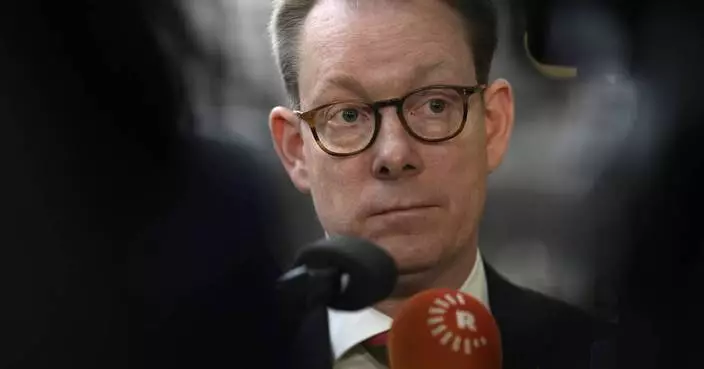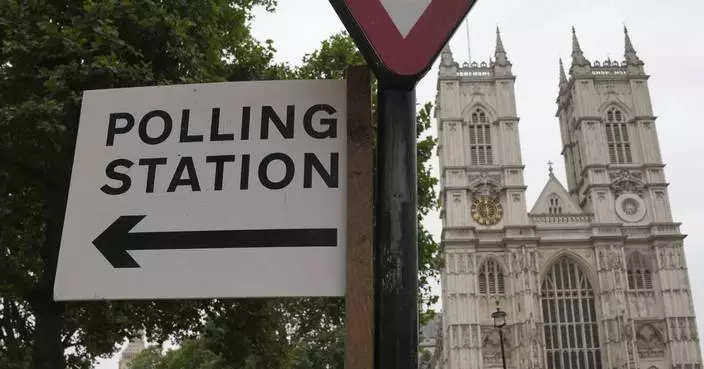WASHINGTON (AP) — U.S. officials have approved another Alzheimer’s drug that can modestly slow the disease, providing a new option for patients in the early stages of the incurable, memory-destroying ailment.
The Food and Drug Administration approved Eli Lilly’s Kisunla on Tuesday for mild or early cases of dementia caused by Alzheimer’s. It’s only the second drug that’s been convincingly shown to delay cognitive decline in patients, following last year’s approval of a similar drug from Japanese drugmaker Eisai.
The delay seen with both drugs amounts to a matter of months — about seven months, in the case of Lilly’s drug. Patients and their families will have to weigh that benefit against the downsides, including regular IV infusions and potentially dangerous side effects like brain swelling.
Physicians who treat Alzheimer’s say the approval is an important step after decades of failed experimental treatments.
“I’m thrilled to have different options to help my patients,” said Dr. Suzanne Schindler, a neurologist at Washington University in St. Louis. “It’s been difficult as a dementia specialist — I diagnose my patients with Alzheimer’s and then every year I see them get worse and they progress until they die.”
Both Kisunla and the Japanese drug, Leqembi, are laboratory-made antibodies, administered by IV, that target one contributor to Alzheimer's — sticky amyloid plaque buildup in the brain. Questions remain about which patients should get the drugs and how long they might benefit.
The new drug's approval was expected after an outside panel of FDA advisors unanimously voted in favor of its benefits at a public meeting last month. That endorsement came despite several questions from FDA reviewers about how Lilly studied the drug, including allowing patients to discontinue treatment after their plaque reached very low levels.
Costs will vary by patient, based on how long they take the drug, Lilly said. The company also said a year’s worth of therapy would cost $32,000 — higher than the $26,500 price of a year’s worth of Leqembi.
The FDA’s prescribing information tells doctors they can consider stopping the drug after confirming via brain scans that patients have minimal plaque.
More than 6 million Americans have Alzheimer’s. Only those with early or mild disease will be eligible for the new drug, and an even smaller subset are likely to undergo the multi-step process needed to get a prescription.
The FDA approved Kisunla, known chemically as donanemab, based on results from an 18-month study in which patients given getting the treatment declined about 22% more slowly in terms of memory and cognitive ability than those who received a dummy infusion.
The main safety issue was brain swelling and bleeding, a problem common to all plaque-targeting drugs. The rates reported in Lilly's study — including 20% of patients with microbleeds — were slightly higher than those reported with competitor Leqembi. However, the two drugs were tested in slightly different types of patients, which experts say makes it difficult to compare the drugs' safety.
Kisunla is infused once a month compared to Leqembi’s twice-a-month regimen, which could make things easier for caregivers who bring their loved ones to a hospital or clinic for treatment.
“Certainly getting an infusion once a month is more appealing than getting it every two weeks,” Schindler said.
Lilly's drug has another potential advantage: Patients can stop taking it if they respond well.
In the company’s study, patients were taken off Kisunla once their brain plaque reached nearly undetectable levels. Almost half of patients reached that point within a year. Discontinuing the drug could reduce the costs and safety risks of long-term use. It's not yet clear how soon patients might need to resume infusions.
Logistical hurdles, spotty insurance coverage and financial concerns have all slowed the rollout of competitor Leqembi, which Eisai co-markets with U.S. partner Biogen. Many smaller hospitals and health systems aren’t yet setup to prescribe the new plaque-targeting Alzheimer's drugs.
First, doctors need to confirm that patients with dementia have the brain plaque targeted by the new drugs. Then they need to find a drug infusion center where patients can receive therapy. Meanwhile, nurses and other staff must be trained to perform repeated scans to check for brain swelling or bleeding.
“Those are all things a physician has to have set up," said Dr. Mark Mintun, who heads Lilly’s neuroscience division. "Until they get used to them, a patient who comes into their office will not be offered this therapy.”
The Associated Press Health and Science Department receives support from the Howard Hughes Medical Institute’s Science and Educational Media Group. The AP is solely responsible for all content.
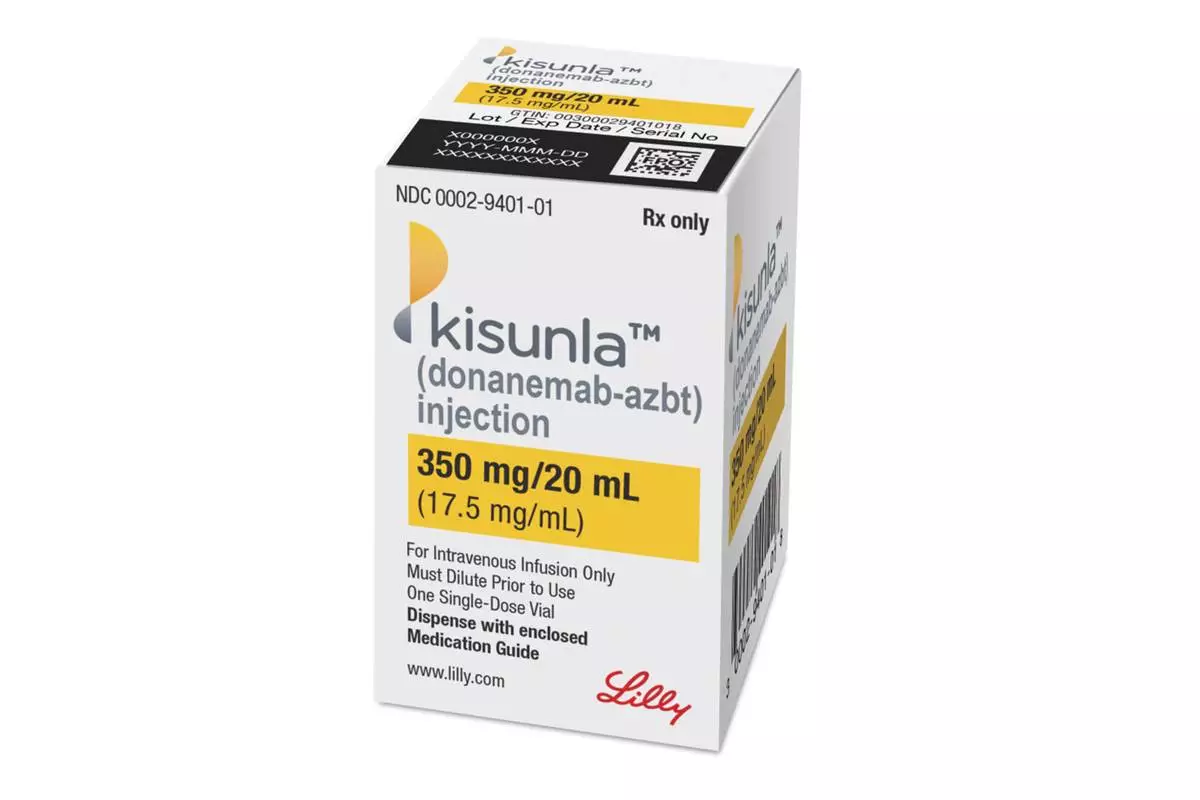
This image provided by Eli Lilly shows the company's new Alzheimer’s drug Kisunla. The Food and Drug Administration approved Eli Lilly’s Kisunla on Tuesday, July 2, 2024 for mild or early cases of dementia caused by Alzheimer’s. (Eli Lilly and Company via AP)
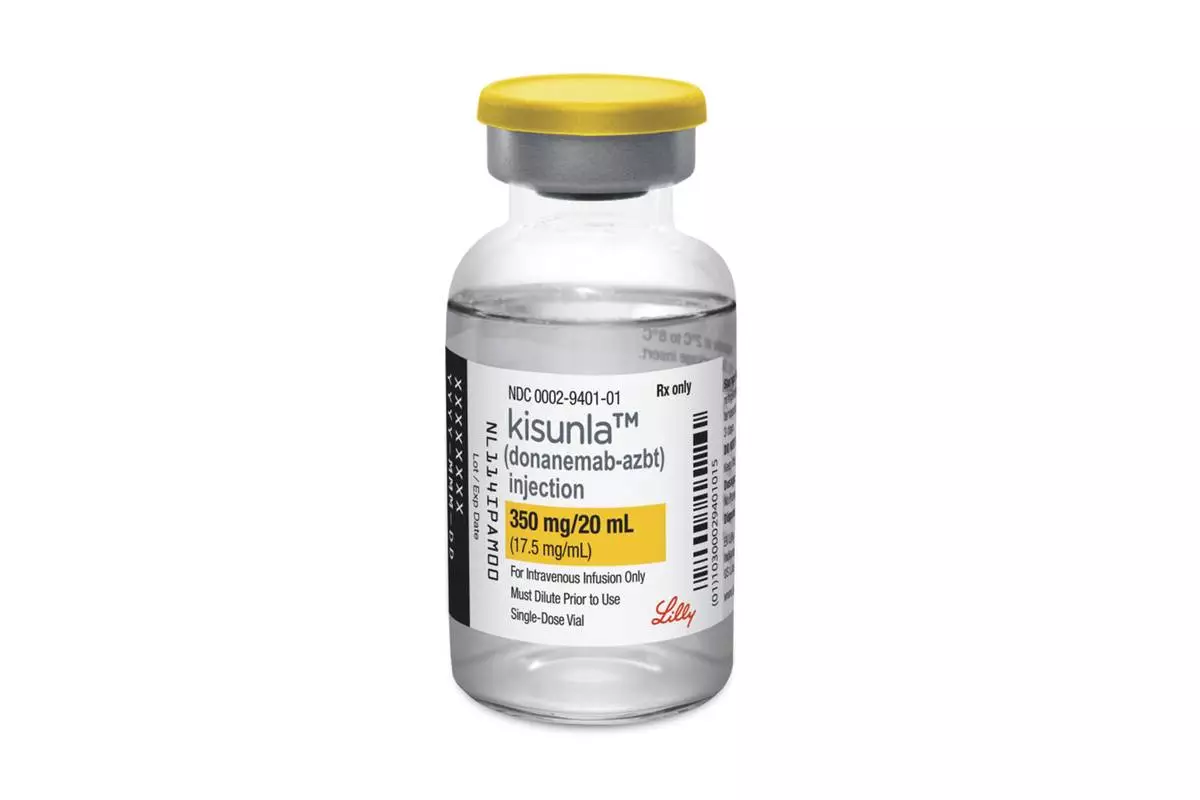
This image provided by Eli Lilly shows the company's new Alzheimer’s drug Kisunla. The Food and Drug Administration approved Eli Lilly’s Kisunla on Tuesday, July 2, 2024 for mild or early cases of dementia caused by Alzheimer’s. (Eli Lilly and Company via AP)
The age question for presidential candidates is more than four decades old. President Ronald Reagan answered it with a pledge to resign if he became impaired, and later with a clever joke that reset his campaign from a stumbling debate performance to a 49-state landslide and a second term.
"I will not make age an issue of this campaign," Reagan said to the question he knew was coming in perhaps the most famous mic-drop moment in campaign history. "I am not going to exploit for political purposes my opponent's youth and inexperience."
The audience roared, even Democratic Vice President Walter Mondale laughed — and Reagan's reelection was back on track.
Today, Democratic President Joe Biden, 81, is struggling for such a redemptive moment after a disastrous debate performance against Republican former president Donald Trump, 78. Those 90 minutes last week set off alarms among Democrats hoping Biden would keep Trump from returning to the White House — and heightened concern among voters long skeptical of how either elderly man would govern a complex nation of more than 330 million people for four more years.
More than two dozen people who have spent time with the president privately described him as often sharp and focused. But he also has moments, particularly later in the evening, when his thoughts seem jumbled and he trails off mid-sentence or seems confused, they said. Sometimes he doesn’t grasp the finer points of policy details. He occasionally forgets people’s names, stares blankly and moves slowly around the room, they said.
Biden has vowed to stay in the race, despite signs of eroding support on Capitol Hill.
"I am running … no one’s pushing me out,” Biden said on a call Wednesday with staffers from his reelection campaign. “I’m not leaving. I’m in this race to the end and we’re going to win.”
But the question facing him is far more intimate, according to one expert who covered Reagan's health during his presidency.
“The most important debate of the campaign is the one taking place right now in Joe Biden’s head between the part of mind telling him he’s the chosen one, and the more self-aware part,” said Rich Jaroslavsky of the University of California Berkeley, formerly of the Wall Street Journal.
At its heart, the question — how old is too old to be president? — is about competence. And Americans have never had wider personal experience with the effects of aging than they do today.
A surge of retiring baby boomers means that millions more Americans know when they see someone declining. For many, this widespread experience made Biden’s halting performance during Thursday’s debate a familiar reality check.
Trump seemed more vigorous, even though he lied about or misstated a long list of facts. When he challenged Biden to a cognitive test, Trump flubbed the name of the doctor who had administered his. For now, he's ceding the spotlight.
“Is this an episode, or is this a condition?” Rep. Nancy Pelosi, D-Calif., 84, wondered on MSNBC, reflecting the question dominating Democratic circles this week. "It’s legitimate — of both candidates.”
Reagan faced the same questions even before he was elected as the oldest president to that point. In 1980, at 69, he pledged to resign if he sensed serious cognitive decline while in office.
“If I were president and had any feeling at all that my capabilities had been reduced before a second term came, I would walk away,” he told the New York Times on June 10, 1980. "By the same token, I would step down also.”
That didn't happen. Reagan served two full terms, leaving office in 1989. He announced in 1994 that he had been diagnosed with Alzheimer's disease. He died in 2004.
Neither Trump nor Biden has made a similar pledge, and their campaigns did not respond to requests for comment Wednesday.
For Reagan, the age issue faded in his first term as any health questions focused on his recovery from a nearly fatal assassination attempt in 1981. He seemed headed for an easy reelection. And debates seemed natural settings for the smooth-talking former Hollywood actor. But his performance in the first showdown with Mondale in the 1984 campaign brought the age issue roaring back.
The president, then 73, rambled and hesitated. He seemed to lose his train of thought at one point, and appeared tired at others. No one had seen him perform publicly in such a way, recalled Jaroslovsky, who co-authored a story headlined: “New Question in Race: Is Oldest U.S. President Now Showing His Age?”
Reagan's age — really, his fitness for a second term — was now indelibly part of the 1984 race, a striking parallel to what is happening in 2024 in the aftermath of Biden's shaky debate performance. But there are key differences.
Reagan was leading going into the first debate, while Biden and Trump were virtually tied. Onstage, "Biden was terrible out of the gate,” said Jaroslovsky, the founder of the Online News Association.
Then, as now, Jaroslovsky said, the embattled president's supporters provided vigorous spin.
Reagan's operation said he had been tired. There was sniping about the staff overpreparing him, Jaroslovsky said. Biden's team cited fatigue from two overseas trips that had exhausted even younger staffers. It was a bad night, they said. Blame flew at the president's aides. Democrats on Capitol Hill griped that Biden's performance had damaged their chances at the polls. And press critics asserted that reporters had failed to hold the president and his staff to account.
By Tuesday, pressure was building on Biden to withdraw from the race and open a difficult process for Democrats to nominate someone else. The crisis rippled across the Democratic Party just over six weeks before its convention in Chicago. It's not clear that Biden and Trump will debate a second time.
Reagan's moment in 1984 came during the second debate at the 33 minute-mark, when The (Baltimore) Sun's Henry Trewhitt said: “You already are the oldest president in history, and some of your staff say you were tired after your most recent encounter with Mr. Mondale." Here, Reagan squared his feet and suppressed a smile. He was ready.
Trewhitt noted that President John F. Kennedy (the youngest American elected president) got hardly any sleep during the Cuban Missile Crisis: “Is there any doubt in your mind that you would be able to function in such circumstances?”
“Not at all, Mr. Trewhitt," Reagan said. Later, he declared, “I am in charge.”
This story corrects Trump’s age to 78 throughout.
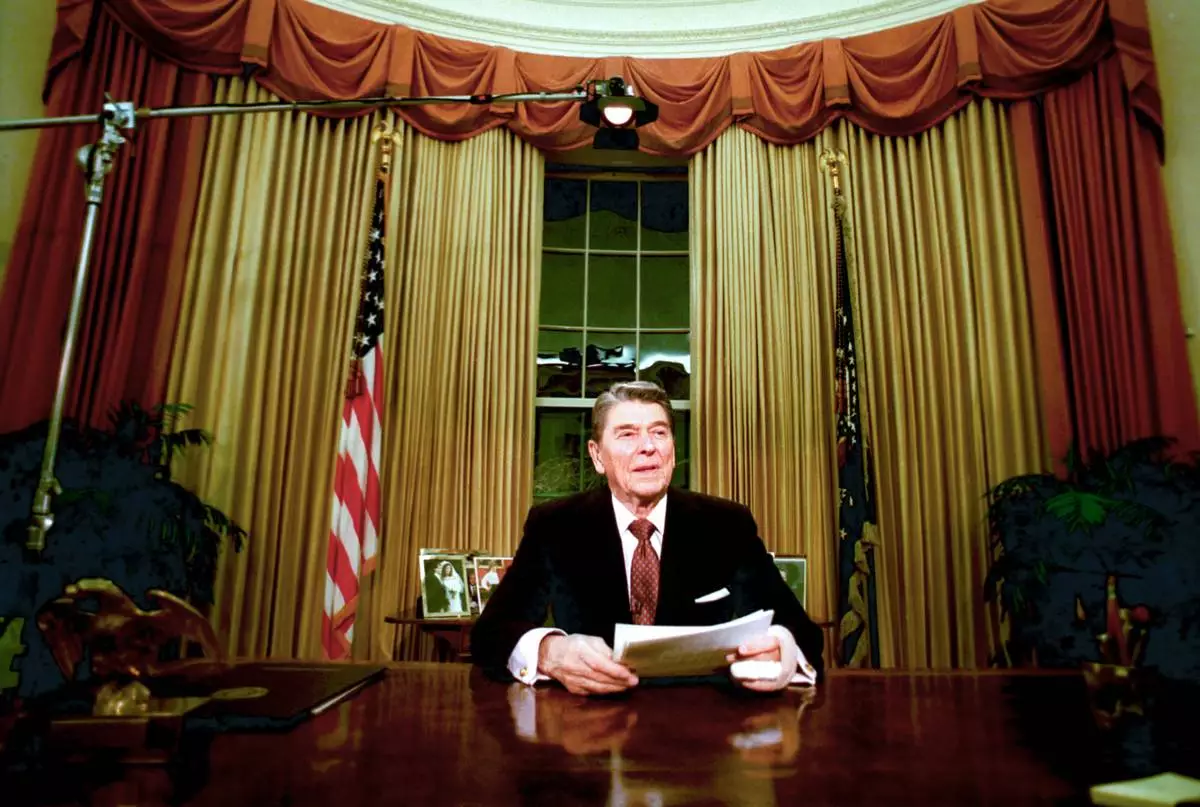
FILE - President Ronald Reagan sits in the Oval Office after he delivered his farewell address to the nation Jan. 11, 1989, from the Oval Office of the White House in Washington. The age question for presidential candidates is more than four decades old. (AP Photo/Ron Edmonds, File)
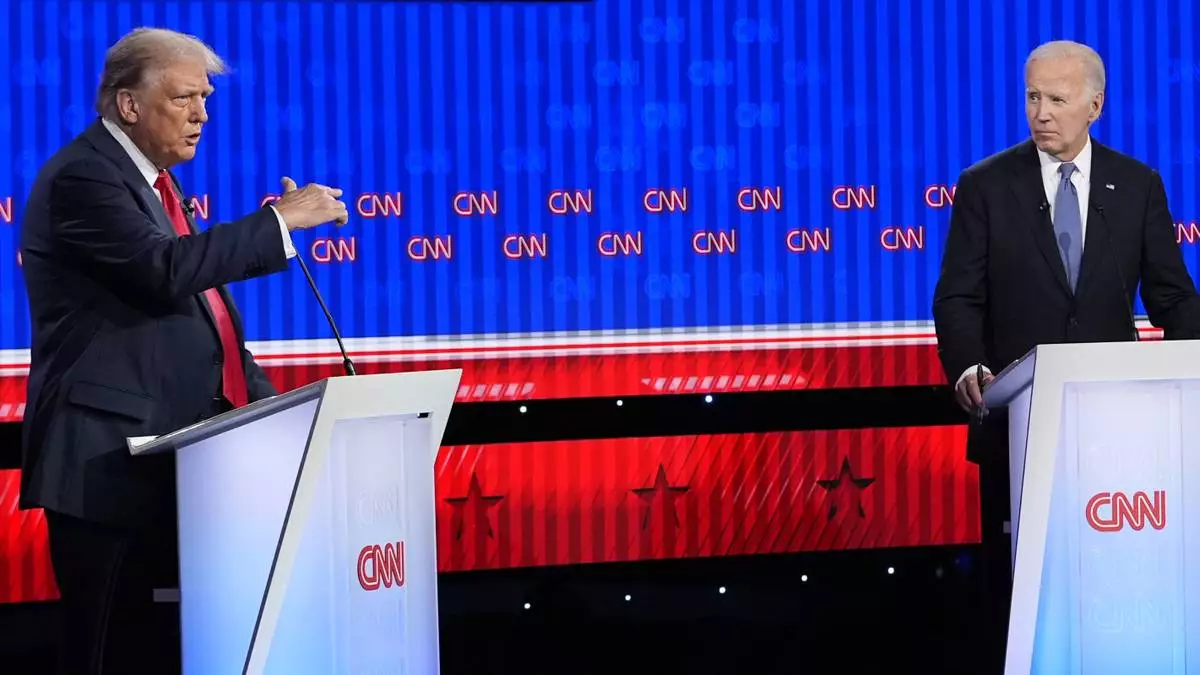
FILE - Republican presidential candidate former President Donald Trump speaks during a presidential debate hosted by CNN with President Joe Biden, June 27, 2024, in Atlanta. The age question for presidential candidates is more than four decades old. (AP Photo/Gerald Herbert, File)
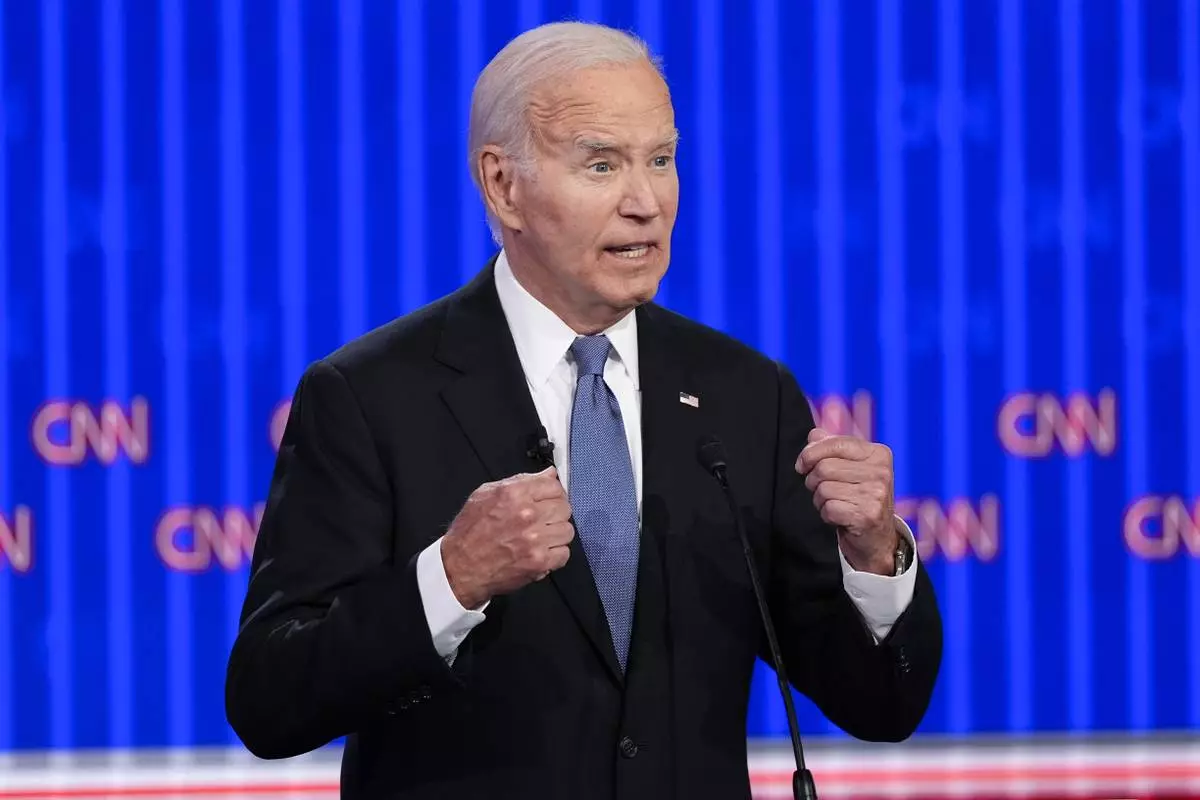
FILE - President Joe Biden speaks during a presidential debate with Republican presidential candidate former President Donald Trump, June 27, 2024, in Atlanta. The age question for presidential candidates is more than four decades old. (AP Photo/Gerald Herbert)
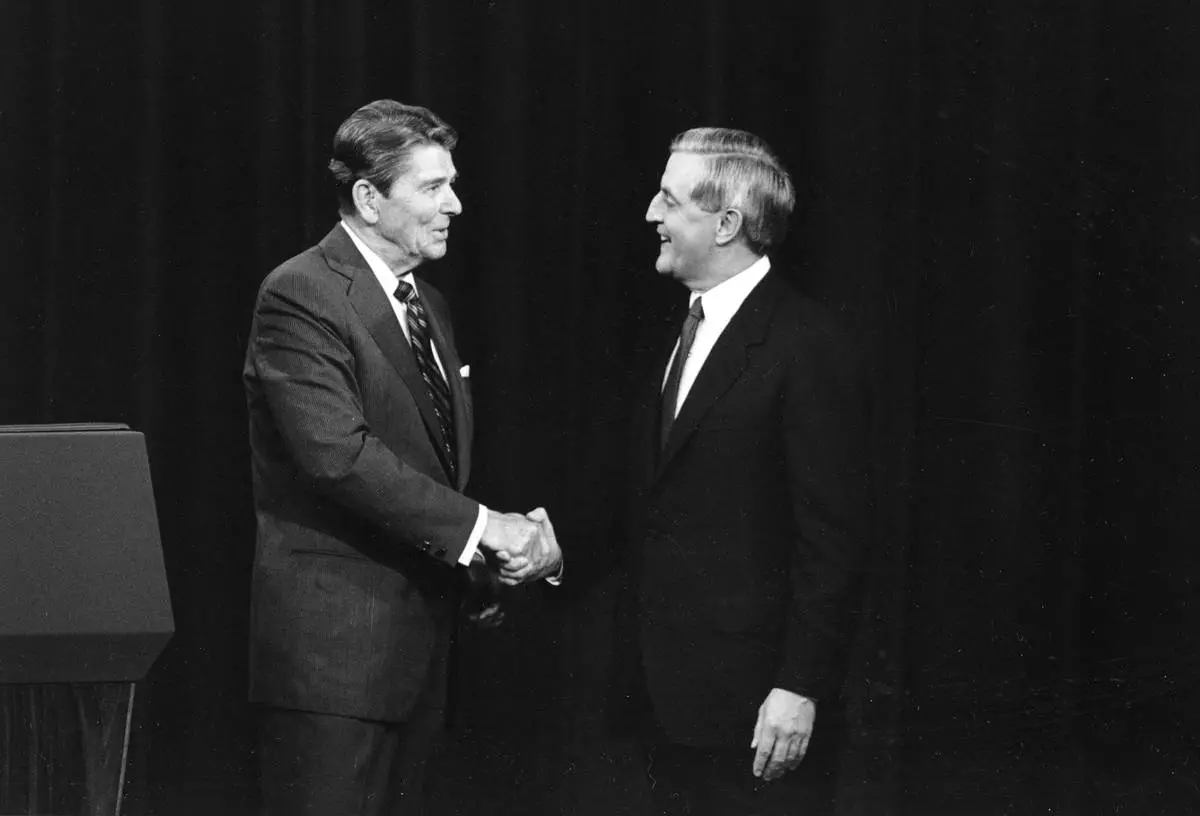
FILE - President Ronald Reagan, left, and his Democratic challenger Walter Mondale, shake hands before debating in Kansas City, Mo., Oct. 22, 1984. The age question for presidential candidates is more than four decades old. (AP Photo/Ron Edmonds, File)




